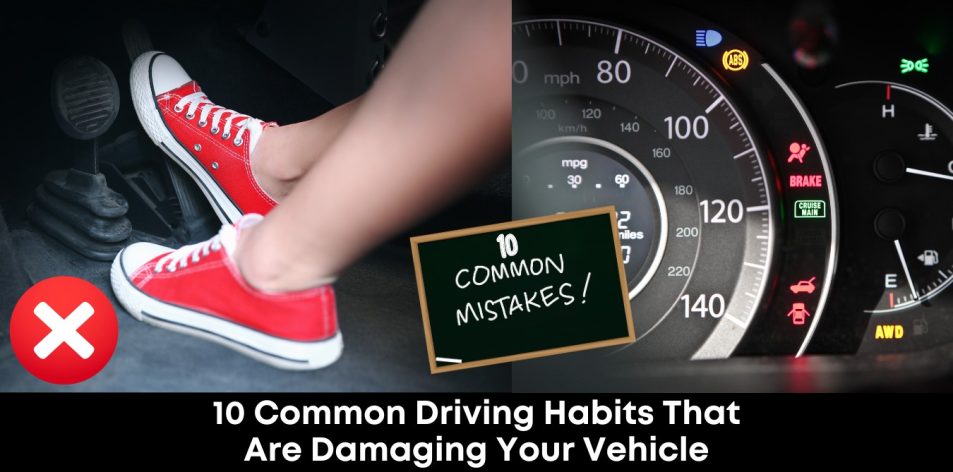Avoid These Mistakes to Extend Your Car’s Lifespan and Save Money
Your vehicle is a significant investment and a vital tool for daily life. While we all rely on our cars, many of us unknowingly engage in habits that cause unnecessary wear and tear, leading to costly repairs and a shorter vehicle lifespan. By being mindful of these common mistakes, you can significantly improve your car’s health, enhance its performance, and save a substantial amount of money in the long run. Here are 10 mistakes that regular drivers make that could be quietly ruining your vehicle.
1. Aggressive Acceleration and Hard Braking
Slamming the accelerator to speed off from a standstill or braking harshly at the last minute puts immense strain on your engine, transmission, and braking system. This increases fuel consumption, wears down brake pads and discs faster, and adds stress to your engine mounts.
- Solution: Accelerate gently and anticipate traffic flow to brake smoothly and gradually.
2. Riding the Brakes Downhill
When descending a long hill, continuously pressing the brake pedal (riding the brakes) causes the brakes to overheat. This can lead to brake fade, where the brakes lose their effectiveness, and warpage of the brake discs, which results in a pulsating feeling when you brake later on.
- Solution: Use your vehicle’s engine braking (downshifting to a lower gear) to help control your speed and save your brakes.
3. Ignoring Warning Lights
Those lights on your dashboard are not just for decoration. They are a crucial communication system from your car’s onboard computer. Ignoring a check engine light, oil pressure warning, or temperature gauge can lead to catastrophic engine failure or other severe damage.
- Solution: Never ignore a warning light. Pull over safely and consult your car’s manual, and if the issue is serious, seek immediate professional help.
4. Skipping Regular Oil Changes
Engine oil is the lifeblood of your vehicle. It lubricates the engine’s moving parts, reduces friction, and prevents overheating. Over time, oil becomes dirty and less effective, leading to increased wear on engine components and potential engine damage.
- Solution: Adhere strictly to the manufacturer’s recommended oil change schedule, typically every 5,000 to 10,000 kilometres, depending on the car model and type of oil.
5. Driving with an Empty Fuel Tank
Continuously driving on a low fuel level is harmful. The fuel pump relies on the fuel in the tank to keep it cool and lubricated. When the fuel level is consistently low, the pump can overheat and fail prematurely. The sediments at the bottom of the tank can also be picked up, clogging the fuel filter and injectors.
- Solution: Get into the habit of refuelling when your tank reaches a quarter-full.
6. Resting Your Hand on the Gearstick
In a manual car, resting your hand on the gearstick places pressure on the transmission’s selector fork and other internal components. This seemingly harmless habit can cause premature wear and tear on the transmission, leading to costly repairs over time.
- Solution: Always keep both hands on the steering wheel, unless actively changing gears.
7. Hitting Potholes and Speed Bumps at High Speed
The impact of hitting a pothole or a rough speed bump at speed can cause immediate damage to your tyres, rims, suspension system, and steering alignment. Over time, this repeated shock can lead to premature failure of shock absorbers and steering components.
- Solution: Be vigilant and slow down for all road irregularities. If you can’t avoid a pothole, try to pass over it with your front and rear wheels rather than driving one wheel directly into it.
8. Ignoring Your Tyres
Your tyres are the only part of your car that touches the road. Driving on underinflated tyres reduces fuel economy, increases tyre wear, and is a safety risk. Over-inflated tyres can lead to a rougher ride and less grip.
- Solution: Check your tyre pressure at least once a month and ensure it matches the vehicle manufacturer’s recommendation. Also, check the tread depth and rotate your tyres regularly.
9. Ignoring Minor Sounds and Smells
That subtle squeak, the new rattling sound, or an unusual smell might be the first sign of a significant problem. Ignoring these early warnings can turn a simple, affordable fix into a major, expensive repair.
- Solution: Pay attention to your vehicle. If you notice a new sound, smell, or sensation, have a professional mechanic check it out as soon as possible.
10. Neglecting Your Car’s Cleanliness
Dirt, dust, and grime are not just an aesthetic issue. Salt and other corrosive materials on the road can cause rust and damage to your car’s paint and undercarriage. A dirty engine bay can also prevent proper heat dissipation.
- Solution: Regularly wash your car, including the undercarriage, to remove corrosive materials. Keep the interior clean to prevent deterioration of surfaces.
By simply adjusting these everyday habits, you can take better care of your vehicle, ensuring it remains reliable, safe, and efficient for many years to come. It’s a proactive approach that protects your investment and provides peace of mind on the road.

